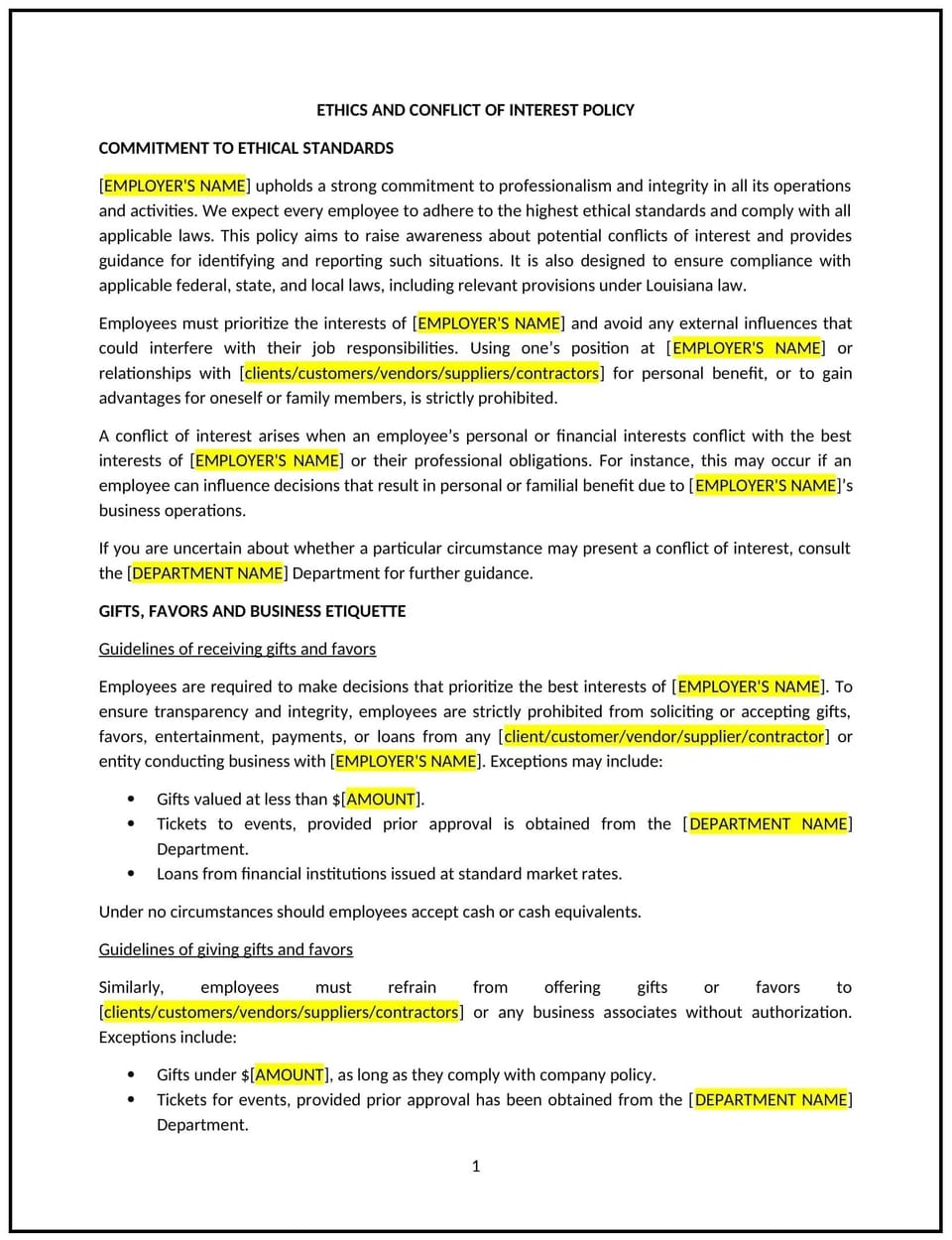Ethics and conflict of interest policy (Louisiana): Free template

Ethics and conflict of interest policy (Louisiana)
This ethics and conflict of interest policy is designed to help Louisiana businesses promote integrity, transparency, and accountability in workplace decision-making. It outlines expectations for ethical conduct, identifies potential conflicts of interest, and provides procedures for addressing ethical concerns.
By implementing this policy, businesses can foster a culture of trust, reduce risks, and support responsible business practices.
How to use this ethics and conflict of interest policy (Louisiana)
- Define ethical standards: Clearly state the company’s commitment to ethical behavior and outline the core principles employees are expected to follow.
- Identify conflicts of interest: Provide examples of conflicts, such as personal relationships, financial interests, or outside employment that could interfere with business decisions.
- Outline disclosure procedures: Specify how employees should disclose potential or actual conflicts of interest to their manager or HR.
- Establish reporting mechanisms: Provide confidential channels for employees to report ethical concerns or suspected misconduct.
- Detail resolution processes: Explain how the business will investigate and address reported conflicts or ethical issues.
- Include training requirements: Require employees to participate in regular training on ethics and conflict of interest topics.
Benefits of using an ethics and conflict of interest policy (Louisiana)
Implementing this policy provides several advantages for Louisiana businesses:
- Builds trust: Reinforces confidence in the company’s integrity and decision-making processes.
- Promotes accountability: Encourages employees to act responsibly and transparently.
- Reduces risks: Helps prevent reputational damage, financial losses, or legal issues related to unethical behavior.
- Encourages consistency: Provides a structured approach for handling ethical concerns and conflicts of interest.
- Reflects Louisiana-specific considerations: Adapts to regional business practices and cultural expectations.
Tips for using this ethics and conflict of interest policy (Louisiana)
- Communicate expectations: Regularly remind employees about ethical standards and the importance of avoiding conflicts of interest.
- Foster openness: Create a culture where employees feel comfortable disclosing potential conflicts or raising concerns.
- Monitor adherence: Periodically review practices to identify and address gaps in ethical conduct or conflict management.
- Provide examples: Use real-world scenarios to illustrate conflicts of interest and appropriate resolutions.
- Update regularly: Revise the policy to reflect changes in business operations, industry standards, or Louisiana regulations.
Q: What qualifies as a conflict of interest under this policy?
A: A conflict of interest occurs when an employee’s personal, financial, or professional interests could interfere with their ability to make unbiased decisions for the business.
Q: How should employees disclose potential conflicts of interest?
A: Employees should disclose conflicts by submitting a written statement to their manager or HR, detailing the nature of the conflict and its potential impact.
Q: What should businesses do if a conflict of interest is identified?
A: Businesses should investigate the conflict, consult with the employee, and implement measures to mitigate its impact, such as reassigning duties or requiring divestiture.
Q: How can businesses promote ethical conduct?
A: Businesses can provide ethics training, establish clear reporting channels, and regularly reinforce the importance of integrity in decision-making.
Q: Are employees required to report suspected unethical behavior?
A: Yes, employees are encouraged to report unethical behavior or conflicts of interest through the designated confidential channels.
Q: How often should this policy be reviewed?
A: The policy should be reviewed annually or when significant changes in business practices or Louisiana regulations occur.
Q: What tools can businesses use to manage ethical concerns?
A: Businesses can implement whistleblower hotlines, maintain confidential reporting systems, and use ethics training platforms to address concerns effectively.
This article contains general legal information and does not contain legal advice. Cobrief is not a law firm or a substitute for an attorney or law firm. The law is complex and changes often. For legal advice, please ask a lawyer.


